Gilderoy was a bonnie boy,
Had roses to his shoon (1);
His stockings were of silken soy,
With garters hanging down.
It was, I ween (2), a comely (3) sight
To see so trim a boy;
He was my jo, and heart’s delight,
My handsome Gilderoy.
[O, sic twa charming een he had;
His breath as sweet's a rose;
He never wore a Highland plaid,
But costly silken clothes;
He gained the love of ladies gay,
Nane e'er to him was coy;
Ah, wae's me! I mourn the day,
For my dear Gilderoy.
My Gilderoy and I were born
Baith in a'e town thegether:
We scant were seven years before,
We 'gan to love each other,
Our daddies and our mammies, they
Were fill'd with meikle joy,
To think upon the bridal day
'Twixt me and Gilderoy.
For Gilderoy, that love of mine,
Gude faith, I freely bought
A wedding sark of holland fine,
Wi' silken flowers wrought,
And he gied me a wedding ring,
Which I received with joy;
Nae lad and lassie e'er could sing
Like me and Gilderoy.]
Wi’ meikle (4) joy we spent our prime,
Till we were baith (5) sixteen;
And aft we pass’d the langsome time
Amang the leaves sae green;
Aft on the banks we’d sit us there,
And sweetly kiss and toy;
Wi’ garlands gay wad deck my hair,
My handsome Gilderoy.
O, that he still had been content
Wi’ me to lead his life;
But ah, his manfu’ heart was bent
To stir in feats of strife;
And he in many a venturous deed
His courage bald wad try,
And now this gars (6) my heart to bleed
For my dear Gilderoy.
[And when of me his leave he took,
The tears they wat mine e'e,
I gave him a love-parting look,
My benison gang wi' thee!
" God speed thee weel, mine ain dear heart.
For gane is all my joy;
My heart is rent sith we maun part,
My handsome Gilderoy. "]
My Gilderoy baith far and near
Was fear’d in ilka toun (7),
And bauldly bear away the gear
Of mony a lowland loun (8);
Nane e’er durst (9) meet him hand to hand,
He was say brave a boy;
At length wi’ numbers he was ta’en
My handsome Gilderoy.
[The Queen of Scots possessit noucht,
That my love lat me want;
For cow and ewe he to me brought,
And e'en when they were scant;
All those did honestly possess,
He never did annoy,
Who never failed to pay their cess
To my love Gilderoy.
Wae worth the loun that made the laws
To hang a man for gear!
To reave of life, for ox or ass,
For sheep, or horse, or mear.
Had not their laws been made so strict
I ne'er had lost my joy;
Wi' sorrow ne'er had wat my cheek,
For my dear Gilderoy.
Gif Gilderoy had done amiss,
He micht have banish'd been;
Ah, what sair cruelty is this,
To hang sic handsome men!
To hang the flower o' Scottish land,
Sae sweet and fair a boy!
Nae lady had sae white a hand
As thee, my Gilderoy!]
Of Gilderoy sae fear’d they were,
They bound him meikle strong;
Till Edinburgh they led him there,
And on a gallows hung;
They hung him high abune the rest,
He was sae trim a boy;
There died the youth whom I loved best,
My handsome Gilderoy.
Thus having yielded up his breath,
I bore his corpse away;
Wi’ tears that trickled for his death,
I washed his comely clay;
And siccar (10) in a grave sae deep,
I laid the dear loved boy;
And now for ever maun I weep
For winsome (11) Gilderoy.
Had roses to his shoon (1);
His stockings were of silken soy,
With garters hanging down.
It was, I ween (2), a comely (3) sight
To see so trim a boy;
He was my jo, and heart’s delight,
My handsome Gilderoy.
[O, sic twa charming een he had;
His breath as sweet's a rose;
He never wore a Highland plaid,
But costly silken clothes;
He gained the love of ladies gay,
Nane e'er to him was coy;
Ah, wae's me! I mourn the day,
For my dear Gilderoy.
My Gilderoy and I were born
Baith in a'e town thegether:
We scant were seven years before,
We 'gan to love each other,
Our daddies and our mammies, they
Were fill'd with meikle joy,
To think upon the bridal day
'Twixt me and Gilderoy.
For Gilderoy, that love of mine,
Gude faith, I freely bought
A wedding sark of holland fine,
Wi' silken flowers wrought,
And he gied me a wedding ring,
Which I received with joy;
Nae lad and lassie e'er could sing
Like me and Gilderoy.]
Wi’ meikle (4) joy we spent our prime,
Till we were baith (5) sixteen;
And aft we pass’d the langsome time
Amang the leaves sae green;
Aft on the banks we’d sit us there,
And sweetly kiss and toy;
Wi’ garlands gay wad deck my hair,
My handsome Gilderoy.
O, that he still had been content
Wi’ me to lead his life;
But ah, his manfu’ heart was bent
To stir in feats of strife;
And he in many a venturous deed
His courage bald wad try,
And now this gars (6) my heart to bleed
For my dear Gilderoy.
[And when of me his leave he took,
The tears they wat mine e'e,
I gave him a love-parting look,
My benison gang wi' thee!
" God speed thee weel, mine ain dear heart.
For gane is all my joy;
My heart is rent sith we maun part,
My handsome Gilderoy. "]
My Gilderoy baith far and near
Was fear’d in ilka toun (7),
And bauldly bear away the gear
Of mony a lowland loun (8);
Nane e’er durst (9) meet him hand to hand,
He was say brave a boy;
At length wi’ numbers he was ta’en
My handsome Gilderoy.
[The Queen of Scots possessit noucht,
That my love lat me want;
For cow and ewe he to me brought,
And e'en when they were scant;
All those did honestly possess,
He never did annoy,
Who never failed to pay their cess
To my love Gilderoy.
Wae worth the loun that made the laws
To hang a man for gear!
To reave of life, for ox or ass,
For sheep, or horse, or mear.
Had not their laws been made so strict
I ne'er had lost my joy;
Wi' sorrow ne'er had wat my cheek,
For my dear Gilderoy.
Gif Gilderoy had done amiss,
He micht have banish'd been;
Ah, what sair cruelty is this,
To hang sic handsome men!
To hang the flower o' Scottish land,
Sae sweet and fair a boy!
Nae lady had sae white a hand
As thee, my Gilderoy!]
Of Gilderoy sae fear’d they were,
They bound him meikle strong;
Till Edinburgh they led him there,
And on a gallows hung;
They hung him high abune the rest,
He was sae trim a boy;
There died the youth whom I loved best,
My handsome Gilderoy.
Thus having yielded up his breath,
I bore his corpse away;
Wi’ tears that trickled for his death,
I washed his comely clay;
And siccar (10) in a grave sae deep,
I laid the dear loved boy;
And now for ever maun I weep
For winsome (11) Gilderoy.
(1) shoon = shoes il verso è un po’ strano (altrove è scritto come “His breath was sweet as rose”). Letteralmente si traduce con “aveva le rose sulle scarpe”. Nelle versioni inglesi si riporta come “He’d knots of ribbons on his shoes”
(2) to think
(3) comely = attractive
(4) mickle, muckle – much, great
(5) baith = both
(6) gars, maks = to make
(7) toon = town ma qui si intende le farmertoon scozzesi
(8) loon = peasant
(9) durst = dare
(10) siccar = safely
(11) winsome = charming
inviata da Bernart Bartleby - 25/8/2015 - 13:44
Lingua: Italiano
Traduzione italiana di Cattia Salto (dal sito Terre Celtiche già citato) delle sei strofe più comuni di cui alla versione scozzese proposta per prima.
GILDEROY
Gilderoy era un bel ragazzo
aveva scarpe damascate
e le calze di seta
sorrette dalle giarrettiere.
Era, credo, un affascinante spettacolo
vedere un ragazzo così elegante.
Era il mio amato, la delizia del mio cuore
il mio bel Gilderoy.
Con tanta gioia passammo la nostra fanciullezza
fino a quando avemmo entrambi sedici anni
e spesso trascorremmo il tempo andato
tra l’erba così verde.
Spesso sulle rive ci sedevamo
e dolci baci e balocchi
con gaie ghirlande mi decorava i capelli
il mio bel Gilderoy.
Oh, se gli fosse bastato allora
con me passare la sua vita;
ma, ah, il suo cuore valorosamente era incline
a infiammarsi in imprese di lotta
e più di un’avventura il suo forte coraggio
ebbe a mettere alla prova
e ora questo fa sanguinare il mio cuore
per il mio caro Gilderoy.
Il mio Gilderoy era temuto in ogni fattoria
sia lontana che vicina
e arditamente portò via il bestiame
a più di un contadino delle Lowland.
Nessuno osava incontrarlo dappresso
e si diceva che era un ragazzo coraggioso.
Alla fine con i compari è stato preso
il mio bel Gilderoy.
Erano così timorosi di Gilderoy
che lo legarono molto stretto.
Fino a Edimburgo lo portarono
e su una forca lo appesero
lo appesero in alto sopra gli altri.
Era un ragazzo così elegante.
Vi morì il giovane che amavo di più
il mio bel Gilderoy.
Così dopo che ebbe esalato il respiro
ho portato via il suo cadavere.
Piangendo lacrime per la sua morte
ho lavato il suo corpo avvenente
e al sicuro in una fossa profonda
ho messo il caro e amato ragazzo.
E ora per sempre piangerò
per il bel Gilderoy.
Gilderoy era un bel ragazzo
aveva scarpe damascate
e le calze di seta
sorrette dalle giarrettiere.
Era, credo, un affascinante spettacolo
vedere un ragazzo così elegante.
Era il mio amato, la delizia del mio cuore
il mio bel Gilderoy.
Con tanta gioia passammo la nostra fanciullezza
fino a quando avemmo entrambi sedici anni
e spesso trascorremmo il tempo andato
tra l’erba così verde.
Spesso sulle rive ci sedevamo
e dolci baci e balocchi
con gaie ghirlande mi decorava i capelli
il mio bel Gilderoy.
Oh, se gli fosse bastato allora
con me passare la sua vita;
ma, ah, il suo cuore valorosamente era incline
a infiammarsi in imprese di lotta
e più di un’avventura il suo forte coraggio
ebbe a mettere alla prova
e ora questo fa sanguinare il mio cuore
per il mio caro Gilderoy.
Il mio Gilderoy era temuto in ogni fattoria
sia lontana che vicina
e arditamente portò via il bestiame
a più di un contadino delle Lowland.
Nessuno osava incontrarlo dappresso
e si diceva che era un ragazzo coraggioso.
Alla fine con i compari è stato preso
il mio bel Gilderoy.
Erano così timorosi di Gilderoy
che lo legarono molto stretto.
Fino a Edimburgo lo portarono
e su una forca lo appesero
lo appesero in alto sopra gli altri.
Era un ragazzo così elegante.
Vi morì il giovane che amavo di più
il mio bel Gilderoy.
Così dopo che ebbe esalato il respiro
ho portato via il suo cadavere.
Piangendo lacrime per la sua morte
ho lavato il suo corpo avvenente
e al sicuro in una fossa profonda
ho messo il caro e amato ragazzo.
E ora per sempre piangerò
per il bel Gilderoy.
inviata da Bernart Bartleby - 25/8/2015 - 13:45
Lingua: Inglese
Una delle versioni inglesi sette-ottocentesche tratta dalla Bodleian Library dell’Università di Oxford, così come riportata dal già citato The Contemplator, il sito curato da Lesley Nelson-Burns.
GILDEROY
The last, the dreaded hour is come,
That bears my love from me:
I hear the dead note of the drum,
I mark the fatal tree.
The bell has toll'd; it shakes my heart;
The trumpet speaks thy name:
And must my Gilderoy depart,
To bear a death of shame!
No bosom trembles for thy doom;
No mourner wipes a tear;
The gallows' foot is all they tomb,
The sledge is all thy bier.
Oh Gilderoy! I bethought we then
So soon, so sad to part,
When first in Roslin's lovely glen
You triumph'd o'er my heart?
Your locks they glitter'd to the sheen,
Your hunter garb was trim;
And graceful was the ribbon green,
That bound your many limb!
Ah! little thought I to deplore
Those limbs in fetters bound;
Or hear, upon the scaffold floor,
The midnight hammer sound.
Ye cruel, cruel, that combined
The guiltless to pursue;
My Gilderoy was ever kind,
He could not injure you!
A long adieu! but where shall fly
Thy widow all forlorn,
When ev'ry mean and cruel eye
Regards my wo with scorn?
Yes! they will mock thy widow's tears,
And hate thine orphan boy;
Alas! his infant beauty wears
The form of Gilderoy.
Then will I seek the dreary mound
That wraps thy mouldering clay,
And weep and linger on the ground,
And sigh my heart away.
The last, the dreaded hour is come,
That bears my love from me:
I hear the dead note of the drum,
I mark the fatal tree.
The bell has toll'd; it shakes my heart;
The trumpet speaks thy name:
And must my Gilderoy depart,
To bear a death of shame!
No bosom trembles for thy doom;
No mourner wipes a tear;
The gallows' foot is all they tomb,
The sledge is all thy bier.
Oh Gilderoy! I bethought we then
So soon, so sad to part,
When first in Roslin's lovely glen
You triumph'd o'er my heart?
Your locks they glitter'd to the sheen,
Your hunter garb was trim;
And graceful was the ribbon green,
That bound your many limb!
Ah! little thought I to deplore
Those limbs in fetters bound;
Or hear, upon the scaffold floor,
The midnight hammer sound.
Ye cruel, cruel, that combined
The guiltless to pursue;
My Gilderoy was ever kind,
He could not injure you!
A long adieu! but where shall fly
Thy widow all forlorn,
When ev'ry mean and cruel eye
Regards my wo with scorn?
Yes! they will mock thy widow's tears,
And hate thine orphan boy;
Alas! his infant beauty wears
The form of Gilderoy.
Then will I seek the dreary mound
That wraps thy mouldering clay,
And weep and linger on the ground,
And sigh my heart away.
inviata da Bernart Bartleby - 25/8/2015 - 13:46
Lingua: Inglese
La versione di Sandra Kerr (quasi identica a quella di Shirley Collins ma con una penultima strofa in più), tratta da Mainly Norfolk: English Folk and Other Good Music. Si tratta in verità di una versione raccolta nel 1903 da Lucy Broadwood (1858-1929, ricercatrice folklorica) da tal Henry Burstow di Horsham, nel Sussex.
GILDEROY
Now Gilderoy was as bonny a boy as Scotland ever bred,
He'd knots of ribbons on his shoes and a scarlet cloak so red.
He was beloved by the ladies all; he was such a rakish boy
But he was my sovereign heart's delight, my handsome Gilderoy.
Now Gilderoy and I was born both in one town together
And not past seven years of age that we did love each other.
Our dads and mothers did agree and crowned with mirth and joy
To think upon the bridal day 'twixt me and Gilderoy.
Now Gilderoy and I walked out when we were both fifteen
And gently he did lay me down among the leaves so green.
When he had done what he could do he rose and went away;
He was my sovereign heart's delight, my handsome Gilderoy.
Now what a pity, a man be hanged for stealing a woman there
For he stole neither house nor land, nor stole neither horse nor mare.
Yet none dare meet him face to face, he was such a rakish boy,
At length with numbers he was taken, my handsome Gilderoy.
Now Gilderoy is in Edinburgh Town; it's long ere I was there,
They hanged him on the gallows high and he wagged in the air.
His relics they were more esteemed than Hector's were at Troy,
I never loved to see the face that gazed on Gilderoy.
Now Gilderoy is dead and gone, and how then shall I live?
With a brace of pistols at my side, I'll guard his lonely grave.
They hanged him on the gallows high for being such a rakish boy,
But he was my sovereign heart's delight, my handsome Gilderoy.
Now Gilderoy was as bonny a boy as Scotland ever bred,
He'd knots of ribbons on his shoes and a scarlet cloak so red.
He was beloved by the ladies all; he was such a rakish boy
But he was my sovereign heart's delight, my handsome Gilderoy.
Now Gilderoy and I was born both in one town together
And not past seven years of age that we did love each other.
Our dads and mothers did agree and crowned with mirth and joy
To think upon the bridal day 'twixt me and Gilderoy.
Now Gilderoy and I walked out when we were both fifteen
And gently he did lay me down among the leaves so green.
When he had done what he could do he rose and went away;
He was my sovereign heart's delight, my handsome Gilderoy.
Now what a pity, a man be hanged for stealing a woman there
For he stole neither house nor land, nor stole neither horse nor mare.
Yet none dare meet him face to face, he was such a rakish boy,
At length with numbers he was taken, my handsome Gilderoy.
Now Gilderoy is in Edinburgh Town; it's long ere I was there,
They hanged him on the gallows high and he wagged in the air.
His relics they were more esteemed than Hector's were at Troy,
I never loved to see the face that gazed on Gilderoy.
Now Gilderoy is dead and gone, and how then shall I live?
With a brace of pistols at my side, I'll guard his lonely grave.
They hanged him on the gallows high for being such a rakish boy,
But he was my sovereign heart's delight, my handsome Gilderoy.
inviata da Bernart Bartleby - 25/8/2015 - 13:48
Lingua: Italiano
Traduzione italiana della versione inglese precedente, a cura di Cattia Salto, sempre dal sito Terre Celtiche già citato.
“La ballata viaggiando dalla Scozia verso l’Inghilterra trasforma Gilderoy in una vittima innocente il cui unico crimine (che gli vale l’impiccagione) sembra essere stato quello di aver fatto sesso con la propria fidanzata! Più propriamente viene definito come un libertino un “rakish boy“. Un “rake” era un affascinante giovane amante delle donne, delle canzoni, dedito al gioco d’azzardo e all’alcool, uno stile di vita di moda tra i nobili inglesi in quello che venne definito “the period of the rake“, nel corso del 17° secolo, alla corte di Carlo II d’Inghilterra: il libertino aristocratico era intelligente, colto, di spirito arguto e non poneva freni alle avventure amorose e all’abuso di sostanze inebrianti.” (Cattia Salto)
“La ballata viaggiando dalla Scozia verso l’Inghilterra trasforma Gilderoy in una vittima innocente il cui unico crimine (che gli vale l’impiccagione) sembra essere stato quello di aver fatto sesso con la propria fidanzata! Più propriamente viene definito come un libertino un “rakish boy“. Un “rake” era un affascinante giovane amante delle donne, delle canzoni, dedito al gioco d’azzardo e all’alcool, uno stile di vita di moda tra i nobili inglesi in quello che venne definito “the period of the rake“, nel corso del 17° secolo, alla corte di Carlo II d’Inghilterra: il libertino aristocratico era intelligente, colto, di spirito arguto e non poneva freni alle avventure amorose e all’abuso di sostanze inebrianti.” (Cattia Salto)
GILDEROY
Gilderoy era il più bel ragazzo cresciuto in Scozia
Aveva le scarpe con i fiocchi e un mantello scarlatto così rosso
Era amato da tutte le donne e un tale libertino
Era il mio padrone e delizia del mio cuore, il mio bel Gilderoy.
Il giovane Gilderoy ed io eravamo dello stesso paese
E non trascorsero nemmeno sette anni che ci innamorammo uno dell’altra
I nostri genitori erano d’amore e d’accordo
A pensare al giorno delle nozze tra me e Gilderoy.
Gilderoy ed io, quando eravamo quindicenni andammo a passeggiare
E con gentilezza lui mi coricò tra l’erba verde
Dopo che ebbe fatto quello che voleva si alzò e se ne andò
Era il mio padrone e delizia del mio cuore, il mio bel Gilderoy.
E che peccato che un uomo sia impiccato per aver derubato (un’altra) donna
Perchè non prese né case, né terre, e nemmeno cavalli o giumente
Alla fine con i compari è stato preso il mio bel Gilderoy
E tuttavia nessuno osava fronteggiarlo perchè era un tale libertino.
Alla fine nella città di Edimburgo, ci volle tempo prima che io fossi lì
Lo appesero al di sopra degli altri a penzolare all’aria
Le sue spoglie erano più stimate che quello di Ettore di Troia
Non ho mai amato vedere il viso che si fissava su Gilderoy.
Ora Gilderoy è morto e sepolto e allora come posso sopravvivere?
Con un paio di pistole al mio fianco veglierò sulla sua tomba solitaria.
Lo hanno impiccato sulla forca in alto perchè era un libertino
Ma era il mio padrone e delizia del mio cuore, il mio bel Gilderoy.
Gilderoy era il più bel ragazzo cresciuto in Scozia
Aveva le scarpe con i fiocchi e un mantello scarlatto così rosso
Era amato da tutte le donne e un tale libertino
Era il mio padrone e delizia del mio cuore, il mio bel Gilderoy.
Il giovane Gilderoy ed io eravamo dello stesso paese
E non trascorsero nemmeno sette anni che ci innamorammo uno dell’altra
I nostri genitori erano d’amore e d’accordo
A pensare al giorno delle nozze tra me e Gilderoy.
Gilderoy ed io, quando eravamo quindicenni andammo a passeggiare
E con gentilezza lui mi coricò tra l’erba verde
Dopo che ebbe fatto quello che voleva si alzò e se ne andò
Era il mio padrone e delizia del mio cuore, il mio bel Gilderoy.
E che peccato che un uomo sia impiccato per aver derubato (un’altra) donna
Perchè non prese né case, né terre, e nemmeno cavalli o giumente
Alla fine con i compari è stato preso il mio bel Gilderoy
E tuttavia nessuno osava fronteggiarlo perchè era un tale libertino.
Alla fine nella città di Edimburgo, ci volle tempo prima che io fossi lì
Lo appesero al di sopra degli altri a penzolare all’aria
Le sue spoglie erano più stimate che quello di Ettore di Troia
Non ho mai amato vedere il viso che si fissava su Gilderoy.
Ora Gilderoy è morto e sepolto e allora come posso sopravvivere?
Con un paio di pistole al mio fianco veglierò sulla sua tomba solitaria.
Lo hanno impiccato sulla forca in alto perchè era un libertino
Ma era il mio padrone e delizia del mio cuore, il mio bel Gilderoy.
inviata da Bernart Bartleby - 25/8/2015 - 13:49
×
![]()



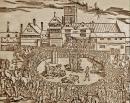

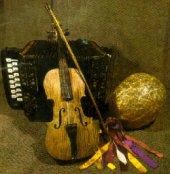
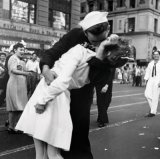
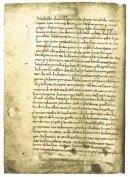
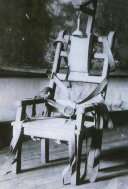
Ballata nativa della Scozia, poi transitata in Inghilterra, la cui melodia originaria viene fatta risalire all’ “En Gaudeat” gregoriano medievale. La musica si trova già nella prima edizione (1651) de “The Dancing Master”, manuale per le danze inglesi tradizionali pubblicato da John Playford, editore specializzato in musica.
Ho incontrato questa ballata – che molte somiglianze ha con Geordie, or My Geordie Will Be Hanged In A Golden Chain, di poco posteriore – nell’esecuzione offerta da Shirley Collins, accompagnata al piano dalla sorella maggiore Dolly, nel disco intitolato “For As Many As Will” del 1978, una versione peraltro molto simile a quella già proposta qualche anno prima da Sandra Kerr nell’antologia “The World of Folk Vol. 2” del 1973.
Una bella storia di passione – e d’amore che prosegue oltre la morte – che però non mi convinceva molto nella trama: possibile che Gilderoy fosse stato impiccato solo per essere un “rakish boy”, un donnaiolo?!?
Così, cerca che ti cerca, trovo prima una buona scheda su “The Contemplator”, poi l’immancabile thread specifico sul solito, ottimo Mudcat Café e infine – apoteosi! – un’esaustiva pagina in italiano su [[|Terre Celtiche a cura della nostra Cattia Salto]] (dico “nostra” perché ha già fornito parecchi contributi direttamente sulle CCG/AWS)
E il lavoro di Cattia Salto mi ha risparmiato un bel po’ di fatica…
Patrick “Gilderoy” MacGregor fu giustiziato, con tutta la sua banda, perché era un ladro ed un assassino ma a spingerlo sulla strada a commettere le sue nefandezze furono una serie di eventi che ebbero luogo tra la fine del 500 e l’inizio del 600. Il clan MacGregor era piccolo ma bellicoso e nella seconda metà del 500 era entrato in rotta di collisione con il più potente clan Campbell. Perseguitati da questi ultimi, i MacGregor erano già stati ridotti allo stato di “outlaws”, braccati come animali (vita dura nelle Highlands!). All’inizio del 600 il re di Scozia James VI aveva confermato il bando contro i MacGregor e aveva dato mandato al clan Colquhoun di sterminarli. Se non che il 7 febbraio 1603, in località Glen Fruin (Loch Lomond, Dunbartonshire), 400 guerrieri dei MacGregor attaccarono i Colquhoun e, nonostante questi disponessero del doppio delle forze, li massacrarono.
In tutta risposta il re di Scozia dispose con editto che il nome stesso dei MacGregor fosse bandito e cancellato per sempre e che chiunque potesse cacciarli come se si trattasse di semplice selvaggina.
Hai capito perché Gilderoy viveva come viveva ed era tanto incazzato!
La prima versione della ballata che propongo è quella scozzese “extended” completa di 13 strofe, delle quali però non tutte vengono normalmente eseguite. Quelle trascurate sono indicate tra parentesi, in corsivo. Le note sono di Cattia Salto dal sito Terre Celtiche già citato in introduzione.